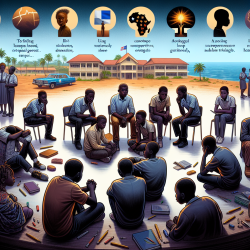Understanding Suicidal Behaviors Among Adolescents in Liberia
Recent research into suicidal behaviors among adolescents in Liberia has unveiled some alarming statistics that demand the attention of mental health practitioners, educators, and policymakers. The study, conducted using data from the 2017 Liberia Global School-based Student Health Survey, found that a significant percentage of school-going adolescents reported suicidal ideation, planning, and attempts within a 12-month period.
Key Findings from the Research
The study revealed that 26.8% of adolescents reported suicidal ideation, 36.5% made specific plans to attempt suicide, and 33.7% attempted suicide within the year preceding the survey. These figures are not just numbers; they represent real children facing severe mental health challenges.
Several factors were identified as correlates of these behaviors, including bullying victimization, food insecurity, leisure-time sedentary behavior, cannabis use, and alcohol drunkenness. Notably, parental monitoring and understanding, as well as having a smaller number of close friends, were associated with reduced odds of suicidal attempts.
Implications for Practitioners
As practitioners, it is crucial to integrate these findings into our practice to improve outcomes for children. Here are some actionable steps:
- Implement Comprehensive Screening: Regular mental health screenings in schools can help identify at-risk adolescents early. This should include questions about bullying, substance use, and family dynamics.
- Promote Parental Involvement: Encourage parents to engage in open dialogues with their children and provide guidance on how to recognize signs of distress and suicidal tendencies.
- Develop School-Based Interventions: Schools should implement anti-bullying programs and provide resources for students to learn coping strategies and emotional regulation.
- Advocate for Policy Changes: Work with policymakers to enhance the enforcement of laws related to substance use and to expand school feeding programs to address food insecurity.
Encouraging Further Research
While this study provides a foundational understanding of the issue, there is a need for further research to explore the cultural and contextual factors unique to Liberia. Qualitative studies could offer deeper insights into the personal experiences of adolescents and the societal norms influencing their behaviors.
Practitioners are encouraged to collaborate with researchers to design studies that can inform more targeted interventions and policy decisions.
Conclusion
The high prevalence of suicidal behaviors among adolescents in Liberia is a call to action for all stakeholders involved in child welfare. By utilizing the insights from this research, practitioners can contribute to developing effective prevention strategies that address the multifaceted nature of these behaviors.
To read the original research paper, please follow this link: Suicidal behaviours among adolescents in Liberia.










